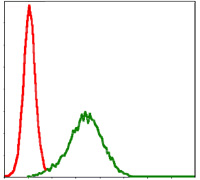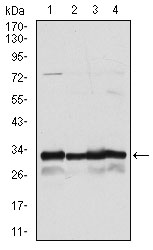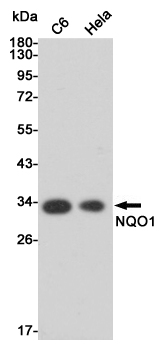-
Product Name
Anti-NQO1 (4E2) Mouse antibody
- Documents
-
Description
NQO1 (4E2) Mouse monoclonal antibody
-
Tested applications
WB, FC
-
Species reactivity
Human
-
Isotype
Mouse IgG1
-
Preparation
Antigen: Purified recombinant fragment of human NQO1 expressed in E. Coli.
-
Clonality
Monoclonal
-
Formulation
Ascitic fluid containing 0.03% sodium azide.
-
Storage instructions
Store at 4°C short term. Store at -20°C long term. Avoid freeze / thaw cycle.
-
Applications
WB: 1/500 - 1/2000
FC: 1/200 - 1/400
ELISA: 1/10000
-
Validations

Flow cytometric analysis of HepG2 cells using NQO1 mouse mAb (green) and negative control (red).

Western blot analysis using NQO1 mAb against human NQO1 (AA: 134-274) recombinant protein. (Expected MW is 41.3 kDa)

Western blot analysis using NQO1 mouse mAb against A549 (1), Hela (2), MCF-7 (3) and HepG2 (4) cell lysate.

Western blot analysis of extracts from MCF7 and Hela cell lysates using NQO1 mouse mAb (1:1000 diluted).Predicted band size:31KDa.Observed band size:31KDa.
-
Background
Swiss-Prot Acc.P15559.This gene is a member of the NAD(P)H dehydrogenase (quinone) family and encodes a cytoplasmic 2-electron reductase. This FAD-binding protein forms homodimers and reduces quinones to hydroquinones. This protein's enzymatic activity prevents the one electron reduction of quinones that results in the production of radical species. Mutations in this gene have been associated with tardive dyskinesia (TD), an increased risk of hematotoxicity after exposure to benzene, and susceptibility to various forms of cancer. Altered expression of this protein has been seen in many tumors and is also associated with Alzheimer's disease (AD). Alternate transcriptional splice variants, encoding different isoforms, have been characterized.
Related Products / Services
Please note: All products are "FOR RESEARCH USE ONLY AND ARE NOT INTENDED FOR DIAGNOSTIC OR THERAPEUTIC USE"
